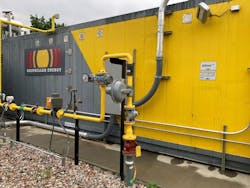European Pet Food Giant Signs 12-year Clean Heat Deal for Hungary Factory
One of Europe’s biggest pet food producers is decarbonizing some of its factory operations through a deal with thermal energy storage producer Brenmiller Energy.
Partners in Pet Food (PPF) Hungaria has signed a 12-year heat-as-a-service agreement with Brenmiller Energy. The project will replace part of PPF’s fossil fuel generation to produce thermal energy storage (TES) heat and power for the facility.
Brenmiller will handle the upfront costs, spending US$5 million to build and operate the 30-MWh company’s trademarked bGen thermal battery adjacent to the manufacturing plant in Dumbovar, Hungary. The payback will be in payments for low-carbon steam and revenues from power to balance the local grid.
Financial terms of the heat-as-a-service contract were not disclosed.
Israel-based Brenmiller Energy’s TES bGen technology is a heat battery using crushed rocks to storage high-temperature heat. Renewable energy or grid power can be used to heat the rock storage up to 650 degrees Celsius (1,202 * Fahrenheit).
Overall, PPF holds a market value of an estimated US$2 billion had has 12 production factories across Europe. It supplies pet food to more than 40 customers, including grocery retailers and specialty pet storages.
Company production totals close to 700,000 metric tons of pet food annually, according to reports. Brenmiller estimates that its bGen heat storage system will help PPF reduce emissions 42% by 2030.
Among the PPF brands are Bozita, Reno, Doggy Vargarda, Shelma and Propesko.
Brenmiller Energy globally has contracted to provide thermal energy storage for projects in its native Israel, New York, Italy and Brazil.
Manufacturing in the industrial sector accounts for close to 20% of greenhouse gasses emitted in the European Union, according to a European Commission report earlier this year. These emissions add up to an estimated 500 billion metric tons of carbon dioxide equivalents, according to the commission report.
